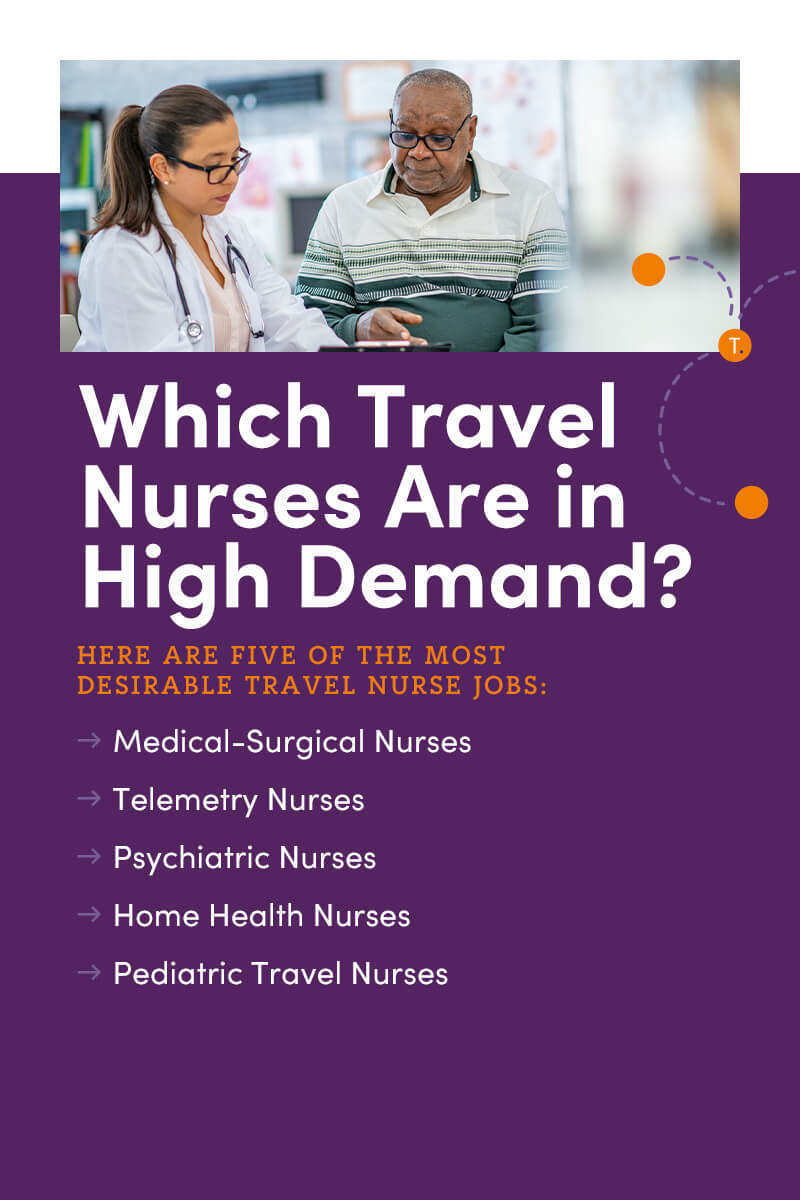An
company | Brands
What Is a Travel Nurse?
Blog/What Is a Travel Nurse?
10 Types of Travel Nurses and What They Do
There are many types of travel nurses, and they all perform unique and crucial functions to support patient wellness. From nurse anesthetists to emergency room nurses, there are so many fields to choose from. If you're looking to specialize in the travel nurse sector but aren't entirely sure which is the best area for you, don't worry.
Read on as we unpack a list of several common types of travel nurses and walk you through a day in the life of each so you can make the right decision for your career.
1. Telemetry
Telemetry nurses are trained to work with the latest technological devices and interpret critical data. They carefully monitor patients' vitals and are typically placed in intermediate care units. They help doctors to administer medications and may assist with certain procedures like electrocardiogram monitoring.
Here are a few of the roles a telemetry nurse may fulfill:
Education: Telemetry nurses can serve a patient-facing role where they may need to inform patients and their families about the condition and lifestyle adjustments required for symptom management.
Monitoring: They monitor patients for possible complications and communicate findings to a healthcare team for early intervention.
Treatment: Telemetry nurses may perform diagnostic tests and life support procedures in some instances.
2. Rehabilitation Nurse
Rehabilitation nurses care for patients with chronic illnesses or disabilities. They help patients restore and maintain physical function and explain discharge plans to help prevent major complications. Rehabilitation RNs work in inpatient and outpatient settings, which gives them a range of travel work options.
Here are the typical duties of a rehabilitation nurse:
Monitoring patients for improvements or lack of improvements
Acting as patient and family advocates on the patient's condition and care plan
Customizing discharge plans based on the patient's illness or disability
Supervising ancillary nurses working with patients under their care
3. Clinic
This involves providing care within a medical clinic environment. These nurses are often the first healthcare professionals that patients communicate with. They don't handle emergency medical issues and instead perform the following duties:
Assessing patients
Administering medication
Educating patients on illness management
Preparing IVs
Updating patient records
Clinic nurses are one of the more demanding roles, and the position is a good fit for those who prefer to work in high-pressure, high-reward environments. They may be required to work during holidays or weekends and can be called in whenever there's a staff shortage.
4. Certified Registered Nurse Anesthetist (CRNA)
A CRNA specializes in administering anesthesia for surgeries and procedures. They typically work alongside a team of healthcare providers but can work alone.
A CRNA or nurse anesthetist is an advanced practice registered nurse (APRN) who undergoes specialized training to acquire the skill set to administer anesthesia safely. They are among the highest-paid nurses, but this depends on location and demand.
5. Obstetrics and Gynecology (OB/GYN) Nurse
OB/GYN nurses specialize in women's health. They work with pregnant and non-pregnant female patients. They screen and monitor women's health conditions and educate women on reproductive health and disease prevention. They may assist with delivering babies and providing postpartum care.
OB/GYN nurses work in hospitals, doctor's offices and clinics. They are supervised by a licensed medical doctor.
6. Emergency Room (ER)
ER nurses handle patients in stressful situations. They communicate with anxious family members and collaborate with other ER staff members. With the shortage of ER nurses, there's an increasing demand for travel ER nurses who can reach hospitals during medical emergencies.
ER nurses care for patients with traumatic or severe medical conditions. Although this ward can be a challenging career path due to the life-threatening ailments patients face, it's equally rewarding because nurses get to save lives on duty.
7. Post-Anesthesia Care Unit (PACU)
PACU nurses work in the post-anesthesia care unit, where they support patients recovering from the effects of anesthesia. They help people make a speedy recovery after surgery and take the necessary steps to prepare them for returning home. This position comes with many different duties depending on the type of surgery, but common tasks include:
Monitoring patient consciousness levels after anesthesia and informing the medical team
Administering medication and other treatments to help patients recover from post-operative symptoms like nausea
Monitoring vitals after surgery and alerting medical teams to any sudden issues
Cleaning and changing dressings and ensuring they're kept clean
Informing patients and families of the post-care steps involved and things to look out for
8. Case Manager
A travel nurse case manager helps develop and review healthcare plans for patients. They typically work with people who are dealing with serious injuries and chronic illnesses. Case managers are registered nurses who collaborate with doctors and other medical professionals to offer patients holistic healthcare.
Their typical duties include advocating for patients and educating them on lifestyle adjustments to improve their prognosis or symptoms. There are different areas of specialization for case managers, including:
Patient: Focuses on a particular patient demographic like pediatrics or geriatrics
Service: Work in a particular service area like rehabilitation or hospice
Duration: Focus on patients who require care for a specific period like long-term illness management or short-term rehabilitation
Disease: Work with patients living with a specific disease or chronic condition, such as cancer or diabetes
9. Endoscopy
One of the many different types of travel nurse jobs is in the endoscopy field. These nurses help surgical teams prepare for endoscopic procedures like colonoscopies, laryngoscopies and bronchoscopies.
Endoscopy nurses help patients feel more comfortable before their procedure by easing any anxieties and answering their questions. They also administer sedation and monitor patients' vitals during the procedure.
10. Intensive Care Unit (ICU)
An ICU nurse works in the intensive care unit with critically ill patients. These nurses are highly skilled in caring for rapidly deteriorating conditions or patients who are coming out of major surgeries.
ICU nurses work in high-pressure conditions and often perform lifesaving duties that create a rewarding work environment. Here are some of their typical responsibilities:
Setting up IVs
Adjusting patient's treatment plans according to disease prognosis and vitals
Checking patients' vitals
Monitoring patient treatment
Operating medical equipment
Collaborating with other healthcare staff to create and implement patient care plans
Responding to medical emergencies and taking quick and potentially lifesaving steps
Conducting diagnostic tests

Find Your Next Nursing Adventure With Trustaff
At Trustaff, we connect different types of nurses with what they love to do. We provide high-paying travel nurse positions so they can build connections and experience new adventures. We offer you comprehensive perks like a 24/7 support team, an extensive selection of jobs and other helpful benefits from our Ingenovis Health ACT (Advocacy, Career, Tools) program.
Are you ready to become a Trustaff traveler? Fill out our quick application form to start your rewarding career and life of adventure. Don't hesitate to contact us with any questions about our staffing process.
